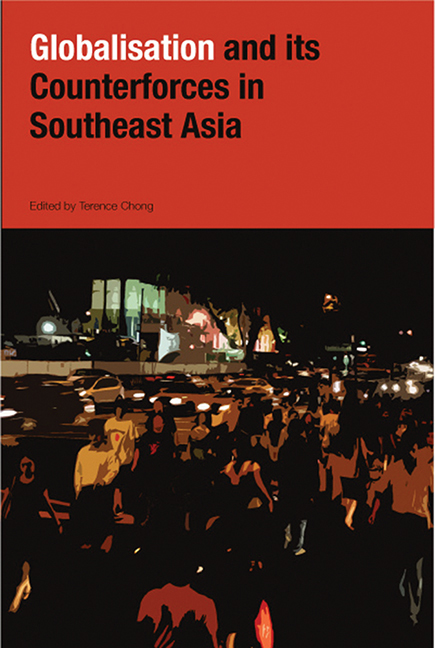Book contents
- Frontmatter
- Contents
- Foreword
- Preface
- The Contributors
- Introduction
- Part I The Political Contradictions of Globalization
- Part II Economic Regionalism and Global Influences
- Part III Local Security, Global Insecurity
- Part IV Social Processes: Arrested Development
- Part V Cultural Production in the Global Matrix
- 15 Measuring Cultural Globalization in Southeast Asia
- 16 The Singaporean Creative Suburb of Perth: Rethinking Cultural Globalization
- 17 Thai Magical Realism and Globalization
- Index
15 - Measuring Cultural Globalization in Southeast Asia
from Part V - Cultural Production in the Global Matrix
Published online by Cambridge University Press: 21 October 2015
- Frontmatter
- Contents
- Foreword
- Preface
- The Contributors
- Introduction
- Part I The Political Contradictions of Globalization
- Part II Economic Regionalism and Global Influences
- Part III Local Security, Global Insecurity
- Part IV Social Processes: Arrested Development
- Part V Cultural Production in the Global Matrix
- 15 Measuring Cultural Globalization in Southeast Asia
- 16 The Singaporean Creative Suburb of Perth: Rethinking Cultural Globalization
- 17 Thai Magical Realism and Globalization
- Index
Summary
INTRODUCTION: MEASURING CULTURAL GLOBALIZATION
Although globalization is clearly one of the major factors driving global economic growth, political interaction, and social development, there has always been some difficulty in attempting to define the concept in a meaningful way. It is typically defined in economic terms, and then illustrated through practical impacts, usually anecdotally. There is tremendous merit to a quantitative assessment of globalization, as this allows analysts and policymakers to better measure trends and to make appropriate policies. However, in this very process of quantifying globalization, its impact is obscured. Data are available for a huge number of phenomenon typically associated with globalization, such as foreign direct investment, international capital flows, and even migration, but typically these measures are abstract and far removed from the actual social and cultural practices of nations, the very areas in which globalization is supposed to have its greatest impact. The most salient impact of globalization, of course, is not in the huge amount of money which is exchanged across national borders on any given day, but rather in its cultural element, the extent to which the social and cultural lives of individuals and societies are influenced by international or transnational phenomenon. Religion, fashion, popular culture, philosophy, and even lifestyles are the domains of life in which globalization is worked out in the most interesting ways, and arguably much more significant in the lives of individuals. However, in the cultural milieu, globalization becomes notoriously difficult to define and measure. There are various reasons for this, which will be addressed later.
In Southeast Asia, the impact of cultural globalization is perhaps a bit more contentious than in some other parts of the world. Singapore, for example, consistently ranks at or near the top of indicators of globalization, and its culture clearly reflects multiple sources. The same is true of the Philippines, and perhaps Thailand.
- Type
- Chapter
- Information
- Globalization and its Counter-Forces in Southeast Asia , pp. 335 - 358Publisher: ISEAS–Yusof Ishak InstitutePrint publication year: 2008



